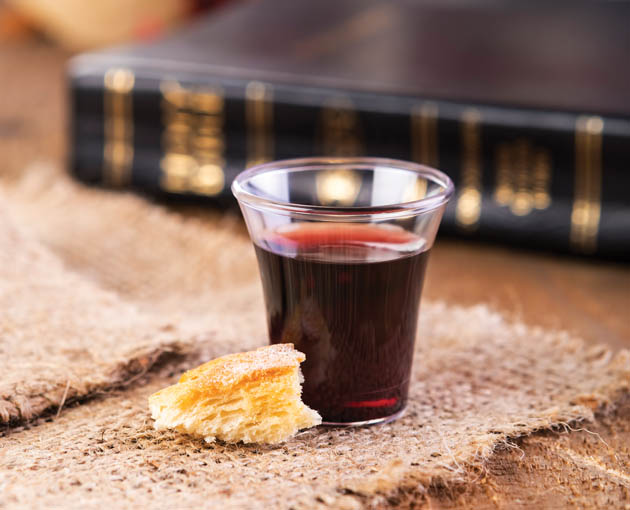Each of our lives is rich with sacred events—the birth of a child, a moment of deep spiritual significance, friendship bonding, a wedding. All are gifts of God’s kindness. Yet, of all the experiences we recognize as sacred, two are common to us all: the sacraments. The word sacrament derives from two words that mean “sacred mystery.” As we share the two sacraments—baptism and Communion—we are participating in sacred reminders of what God has done for us in Jesus Christ.
Why do we affirm that Communion and baptism are sacraments while marriage and ordination are not? Communion and baptism are unique because Jesus participated in both and commanded us to do so. Jesus was baptized; Mark’s Gospel opens with that story. And at the end of Matthew, in His last words, Jesus commanded that we should baptize all who come to faith. All four Gospels relate the story of the Last Supper, when Jesus shared a meal with His twelve disciples on the night He would be arrested. In that meal, He explained that His body would be broken (as the bread was), and that His blood would be poured out (just as the shared cup was), for the forgiveness of sins in a new covenant with God. Because Jesus experienced baptism and Communion and made them ordinances for us, these two worship experiences are sacraments.
All your pastors are ordained to the “ministry of Word and Sacrament.” In the ministry of the Word, we open the Scripture and teach its truth. In the ministry of the sacraments, we offer baptism and Communion, actions in which together we worship not just with words but with our bodies, acting out a specific drama full of significance. J. I. Packer explained it like this: “As the preaching of the Word makes the gospel audible, so the sacraments make it visible, and God stirs up faith by both means.”
The sacraments are an outward, visible sign of an inward, invisible grace. The waters of baptism are rich in meaning, a reminder of our cleansing from the stain of sin and a reminder that Jesus is the living water. In Communion, we understand that we depend on what God has done for us in Jesus. His death paid every penalty for our sins, and His resurrection demonstrated the power of God over death and assures us of our resurrection and eternal life to come. We need this sacred meal again and again. Scripture tells us to examine ourselves before Communion, not that we would declare ourselves worthy, for who could do that? Instead, we remember again that we need the grace and mercy of God and that it is always available.
The sacraments happen in community. We do not baptize ourselves nor serve ourselves Communion. Rather, we depend on each other and share the experience. In baptism, someone has made preparation, whether the baptism is done before a font in a church or outdoors in a body of water. When we have Communion, someone has baked and prepared the bread and the cup. We share it as a common meal, often passing the bread and cup to one another and partaking together, a reminder that no difference in age, race, resumé, or background can separate us. We are brothers and sisters, a family of people who know they need the Lord and have joined themselves to Christ.
The sacraments are signs and seals. As signs, they remind us that our being forgiven, being set in right relationship with our Creator, has been seen to, not by us, but by the life and death and resurrection of our Lord Jesus according to the will of the Father. As seals, they stir our faith as we witness a new baptism or share the Communion meal. They assure us of God’s great love and all He has done to provide for our salvation. They impart God’s grace to us.
These actions, together, these shared sacraments, are our “embodied worship.” We do not simply have a body as if a body is no more than a discardable shell; we are embodied creatures, God’s creation. Jesus came in the flesh—in a body. He cared for and healed bodies broken by injury and illness; He shared walks, talks, and meals with people who needed Him.
by Pastor June Barrow





